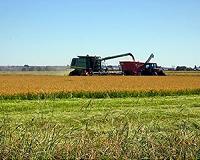 |
Warwick, UK (SPX) Nov 22, 2010 Researchers have uncovered the genetic basis of remarkable broad-spectrum resistance to a viral infection that, in some parts of the world, is the most important pathogen affecting leafy and arable brassica crops including broccoli, cauliflower, cabbage, kale, swede and oilseed rape. They have tested resistant plants against a range of different strains of the virus taken from all over the world and so far, no strain has been able to overcome the resistance. The research on the so-called Turnip mosaic virus (TuMV), led by Dr John Walsh of the University of Warwick and funded under the BBSRC Crop Science Initiative, has been taken forward in a new partnership with Syngenta Seeds. Dr Walsh said "TuMV causes really nasty-looking black necrotic spots on the plants it infects - 'a pox on your' vegetables! This can cause significant yield losses and often leaves an entire crop unfit for marketing. "At best, a field of badly affected Brussels sprouts might provide some animal fodder, but these vegetables would not be appealing to most shoppers. The virus is particularly difficult to control because it is transmitted so rapidly to plants by the insect vectors." Dr Walsh and his team identified the major gene involved in resistance to TuMV and discovered that the way in which it creates resistance is completely new. Using this knowledge, they found that it was possible to identify plants with an inherent resistance that could be used to speed up the breeding process and develop commercial varieties that are resistant to TuMV. The team from University of Warwick are now working with industry partner Syngenta Seeds to breed resistance into Chinese cabbage. They hope in future to do the same with other crops such as broccoli, cabbage and kale. Peter van der Toorn, R and D Lead Leafy Crops, Syngenta Seeds Vegetables said "Working in partnership with academic researchers is very important for us. Through such collaborations it's possible to take an idea from pre-commercial research and turn it into a new variety that can benefit the consumer and boost our contribution to the UK economy. We are very excited to be working together with academics at the University of Warwick to breed varieties with improved resistance to Turnip mosaic virus." Professor Douglas Kell, BBSRC Chief Executive said "Bioscience research in all its forms has always given rise to developments that have impacts in society - whether predicted or serendipitous. "Such developments need a structure through which to realise their potential and a partnership such as this one between the University of Warwick researchers and Syngenta will be important to ensure that resistance to diseases is incorporated into commercial crop varieties. These new resistant varieties would then be available to contribute towards future food security
Share This Article With Planet Earth
Related Links BBSRC Farming Today - Suppliers and Technology
 More Efficient Use Of Farm Inputs Key To Growth
More Efficient Use Of Farm Inputs Key To GrowthCanberra, Australia (SPX) Nov 22, 2010 More efficient use of farm inputs is critical to ensuring continued productivity growth in Australia and New Zealand agriculture, according to CSIRO scientist Dr Michael Robertson. In an address to the Food Security from Sustainable Agriculture conference in Christchurch, New Zealand, Dr Robertson said a sizable gap still exists between what farmers in both countries are producing and what ... read more |
|
| The content herein, unless otherwise known to be public domain, are Copyright 1995-2010 - SpaceDaily. AFP and UPI Wire Stories are copyright Agence France-Presse and United Press International. ESA Portal Reports are copyright European Space Agency. All NASA sourced material is public domain. Additional copyrights may apply in whole or part to other bona fide parties. Advertising does not imply endorsement,agreement or approval of any opinions, statements or information provided by SpaceDaily on any Web page published or hosted by SpaceDaily. Privacy Statement |